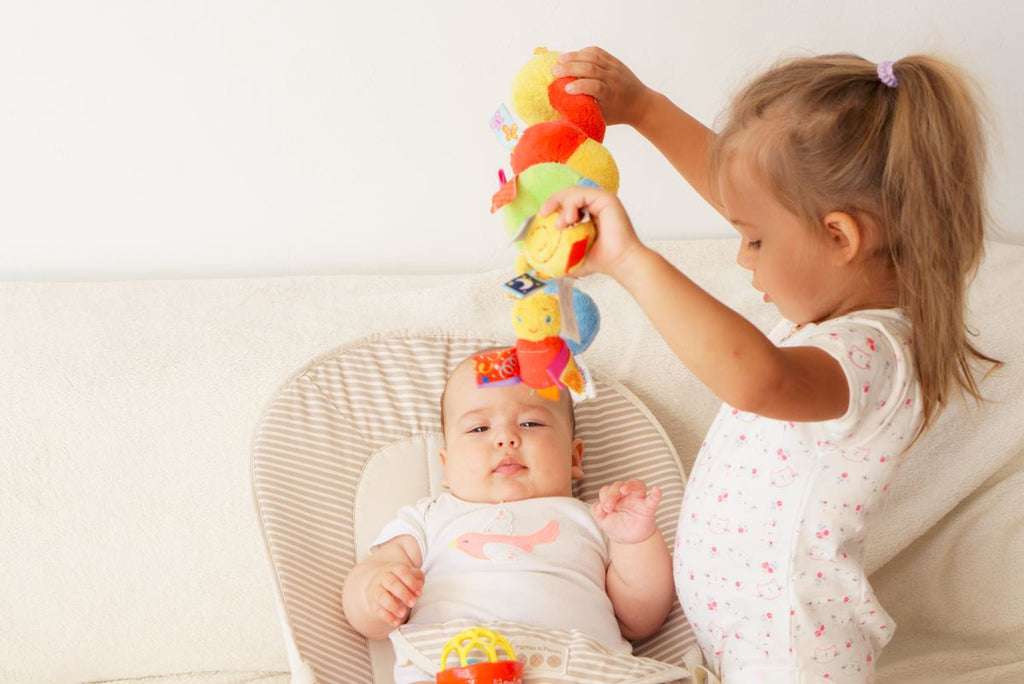
Welcoming a new family member is an exciting time! That said, you may also feel apprehensive about how the older siblings will adjust to the new arrival. Whether they are an only child, preschooler, or older kid, there are ways you can prepare them for this special time. Here are our tips for an easy adjustment to your new family dynamic.
9 Tips to Introduce a New Sibling
When a new sibling joins the family, it can be a difficult adjustment for the older siblings. You want their first—and every—interaction to be positive, so they can grow up to be lifelong friends. To help you achieve this, we have compiled a list of tips for preparing for their first meeting.
1. Explain What Changes Will Come
Just like life changes for new parents, big changes are in store for your children, too. Explaining what day-to-day life will be like with the new baby can help prepare your older child for their arrival. A great way to do this is by reading children’s books about welcoming a new sibling together. Discuss the new baby, what will change, and how often using age-appropriate language, so there are no surprises when you bring home their new younger sibling.
2. Introduce the New Baby Before it's Born
Although they cannot see the baby yet, their baby brother or sister is already nearby! Talk to your baby bump, and encourage them to do the same. Allow them to feel when the baby kicks and share in your excitement. By interacting with the baby, they will begin to develop a bond before their first meeting.
3. Buy a Meaningful Gift for Your Children
The new baby’s arrival brings with it a lot of gifts and attention for the new sibling, which can easily cause an older child to feel left out. To help with this, buy the older siblings a meaningful gift to give to them when the new baby arrives. If you'd like you can tell them it is from the new baby, and that they cannot wait to meet their older sibling.
Older siblings can also help pick out a small gift for the new baby. This can help them feel like they are part of all the excitement, too.
4. Reassure Them That There Won’t Be Any Preferences
Reassure the older siblings that the new baby’s arrival will not change how much you love them. This may seem obvious, but with all of the attention a new baby needs, it is important that they are reminded of how loved and important they are, too.
5. Prepare Your Home in Anticipation of the Baby’s Arrival
Big, sudden changes may be stressful for your children. Allow your children a few months to adjust to changes in the layout of the home, new baby items, or transitioning out of their crib. This way, they can be comfortable with them by the time their new sibling comes home.
6. Have Realistic Expectations
Young children may have a difficult time understanding the changes surrounding the new baby’s arrival. This may lead to them lacking the excitement you’d hoped for. Even older children may experience a sense of sibling rivalry with the new baby. This is common. Don’t try to force a relationship between them; it will come naturally in its own time.
7. Be Positive During their First Meeting
It is natural to feel cautious when your older children meet the baby for the first time. However, be sure to use positive language when telling them how to interact with their new sibling.
Try to avoid using phrases like, “no” or “don’t do that.” Let them know what they are doing correctly, like, “I love how gentle you are with the baby.” “You’re doing a great job.” Boosting their confidence with their new sibling will help them feel closer to them.
8. Make the “Big Kids” Part of the Process
Allow your older children to help you design the nursery. They can pick out paint colors, clothing, toys, and even furniture. When you bring the new baby home, give the older siblings a big kid job to help them feel important. It can be something small, like picking out the baby’s outfit or reading them a book.
9. Spend Quality Time with your Older Kids
Scheduling one-on-one time with your older children will help them adjust to life with the new addition. You can go for a walk, do a craft, or watch a movie together. Whatever you choose, the main goal is that you focus on your time together.
Managing Sibling’s Behaviors by Age
Getting ready for a new baby in the family includes getting your older kids ready to be big brothers or big sisters. By keeping in mind the typical behavior of children at each age, you can create age-appropriate ways to encourage positive behaviors around the new baby.
Here are some important considerations for each age level that will help when introducing them to their new sibling.
Ages One-Two
It is difficult for young children to understand what changes are happening within their family dynamic. Sharing your excitement and enthusiasm around the new baby will help model behavior for them.
They may not seem to notice changes like an added crib, or they may struggle with the transition out of their crib for the baby. No matter their reaction, frame each change as an exciting adventure together.
Ages Two-Four
The adjustment can be harder for future big brothers and sisters within this age group. These young children are more aware of the happenings in the home but are also still very attached to mom and dad.
Frequently using simple language to explain the changes coming with their new family member will help them adjust. Let them know about this exciting time with their new sibling, but also discuss how much time and attention babies need. Explain that the new baby will cry and be unable to play with them for a while. Using age-appropriate language to set expectations and rules will ease the shock of the new baby’s arrival.
School Aged Children
Older children are more independent and can adjust to the changes in their family dynamic easier. Explain the changes to come with their new baby sibling, including both the positives and negatives. Allow them to meet for the first time as soon as possible, and allow them to cuddle and bond when they feel comfortable. Despite being more independent, older siblings still benefit from one-on-one time with mom and dad.
Planning
Children of all ages can help plan for their new baby sibling’s arrival. Allow young children to help you pack your hospital bag, or older children can pick out a toy or outfit to bring to the hospital.
Since young children learn by playing, buying your toddler a baby doll can help them learn about taking care of a baby. Modeling being gentle and kind to the baby doll is an age-appropriate way to set expectations around how to behave with their new family member.
Regression
Regressions are normal when both young children and older siblings experience big life changes. You may notice your only child regress with sleep or potty training. They may act out or become upset easier. These are all normal behaviors for a young child experiencing big emotions.
When visitors come to meet the new arrival, tell them to visit with your older children first. This can help them gain the attention they are seeking.
Handling Emotions
If you notice regressions or outbursts, do not worry. Becoming frustrated is natural, but scolding your older child will not remedy the situation. Providing your children with one-on-one time, reassurance, cuddles, and patience will help them process these big feelings during this exciting time.
Introducing a new sibling is a special time for your family. By remembering our age-appropriate advice, you can help ease the older siblings into this transition, minimize regressions, and increase bonding.
Worried about not being prepared for the arrival of your new baby? Take a look at Nurture& collections for all our nursery must-haves!








